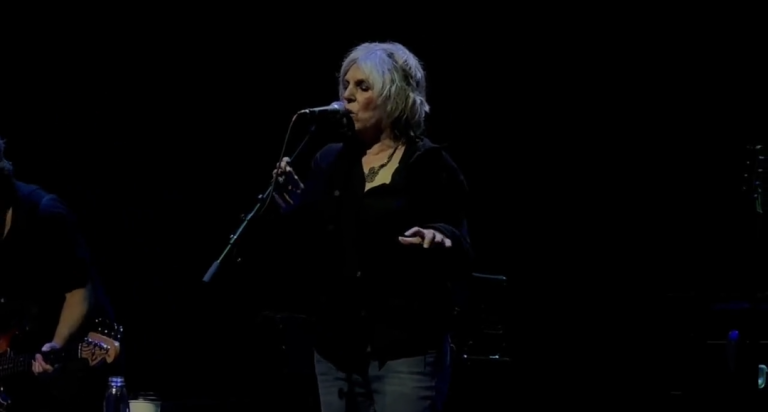Human frailty has always animated Lucinda Williams‘ music. Ever since the release of her first solo material in 1980, with Happy Woman Blues, she’s become a consummate documentarian of the many ways life threatens to break us – addiction, depression, systemic injustice. Lately, it seems to have been weighing on the Lousianan’s mind more than ever – with the relatively recent passing of friends and idols like Tom Petty and Lou Reed – and most recently, Jeff Beck and David Crosby. Both Beck and Reed are honoured in the form of covers of “Cause We’ve Ended as Lovers” and “Pale Blue Eyes”, respectively. Petty meanwhile is eulogised via the Williams-penned “Stolen Moments” – a set highlight which scans as both a lyrical and sonic cousin to 2016’s “Dust” (which, itself, is a meditation on the death of Williams father – the famous poet Miller Williams, who performed at Bill Clinton’s 1997 inauguration).
If frailty and tragedy have proved constant throughlines in Williams’ music, then so has the ways we overcome it. In 2021, Williams suffered a stroke that many assumed necessarily marked the end of her performing. Now, in 2023, she sounds more invigorated and impassioned than ever (a duo of long-time friends sitting next to me, who have seen Williams perform live over a dozen times across many years, remarked at the end of her set that this Saturday night performance was Williams at her best).
After being guided onto the stage at the start of her performance, Williams immediately ripped into one of her most recognizable anthems, the driving “Can’t Let Go”. If any concert goer harboured doubt of Williams performing capacity at the start of the night, such was surely relinquished within the first five minutes of her performance.
Across the remainder of her two hour set (which was supported by the delightful, sibling-led band L.A. Edwards), Williams covered an impressively expansive range of material that spanned her 1998 classic breakthrough Car Wheels on A Gravel Road to her most recent full-length, 2020’s Good Souls Better Angels. The classics remain the classics – the levels of excitement among the crowd viscerally heightened as she begins the title track to Car Wheels and the mere mention of her biggest hit, “Fruits of My Labour”, generated instantaneous applause – and Williams delivered all of the expected nostalgic charm and then some.
But some of the night’s greatest moments derive from her most recent output: 2020’s “Big Black Train” is a dark but resolute reflection on depression whose subject matter is hugely enhanced by Williams’ voice (which is decidedly heavier and more graveley than it was at her commercial apex). New song “Let’s Get The Band Back Together” – an ode to reuniting with old friends – feels like an expert combination and culmination of all of Williams’ four-decade spanning musical output. The immense power the song must hold for Williams and her band, the Buick 6, given her personal circumstances is readily apparent. Given that Williams has been gradually trending towards weightier, bluesier and slower music over the last decade or so, it comes as something of a surprise that “The Band” ranks among her peppiest, most melodic work. It doesn’t sound like a lament, it’s a celebration.
Williams capped off the night with a cover of Neil Young’s “Rockin’ In The Free World”. It’s here that the band sounded their loosest – her two electrifying guitarists (Stuart Mathis and Doug Pettibone) huddled together, playing off each other’s energy, while Williams lifted her right hand, curls it into a fist and repeatedly punched the air. Towards the end, Williams stepped away from the mic and walked towards the stage’s end – the band continuing to play, devoid of any signs of fatigue – and the crowd stepped in for Williams, emphatically delivering the song’s titular cry. As Williams was about to step off the stage steps, the crowd broke into a minutes-long standing ovation (the second of the night). Williams paused, surveying the entranced crowd of nearly 1,200 and placed her hand on her heart; perhaps realising, for the first time that night, how immensely she has moved her audience.

